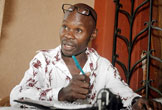David Kato: Life after death

‘Before leaving, the wind blows so I turn, take one long, last look at circle of candles to keep their flame burning in my memory forever. Dead, the wind blew them out. But there is one that stands alone, free, and still burns bright to this day. David Kato.’
Young, strong, sharp, reality’s electric in your present tense – this is who you are before the phone rings:
‘Dead? Murdered, who was?’
David Kato, 46, gay rights activist, Ugandan, bludgeoned with a hammer to the skull in his own home and now a group of organisers in New York City want a vigil in his honour followed by peaceful protest outside Uganda House would you like to come? Poof, just like that, from the time you answered the phone then put it back down, you’re older, weaker, matured in the face of sudden death.
Two days later it’s Thursday and two hundred-plus people gather outside Dag Hammarskjold Plaza on 48th street and 1st Avenue, yourself included. There are larger than life photographs of David Kato in black and white. Posters stamped with his profile held high above cardboard placards written in Kiswahili, east Africa’s lingua franca, the common language that binds a people who share similar customs, tribal traditions, and legislative bigotry against same-sex partnerships.
Marching single column three-person thick, moments later we arrive at the Ugandan Mission to the United Nations. Men, women, leaders at the podium tell us why Kato’s death is so important to this day and age. And so speech after speech adds power to our peaceful protest but the war of words, no matter how poetic or epic, can’t quiet the pain of losing a gay brother to state-sanctioned bigotry, fear, hatred, ignorance, denial, silence.
The speeches die, the drumming stops, the chanting begins:
‘What do you want?’
‘Justice!’
‘When do you want it?’
‘Now!’
‘Can’t hear you. What do you want?!’
‘JUSTICE! JUSTICE! NOW! N—’
Meanwhile Ugandan diplomats, safely snug inside their cozy mission, peep through blinders at the spectacle below. We’re a strong, diverse, fist-pumping crowd directing our anger at nobody in particular.
My first thought? Where is the rage?
My next thought? Why is activism so inactive?
My final thought? Since when is activity action? By which I mean, let’s throw rocks at the window the next time a diplomat dares look down at us, shatter any false sense of safety by breaking glass or spilling blood. Kick down a door or two, set off an alarm maybe, set fire to a tall pile of paper trash. Do something, anything so they feel what it’s like when hatred erupts at any given moment for no reason then goes unpunished and unexplained. Not that revenge can snuff the fire burning in our hearts by bringing David Kato back to life in a world remade without terror, a world filled with social justice. But unexplained hatred directed at someone for no reason is a feeling queers know all too well and Ugandan diplomats don’t know enough of, so maybe they should experience it just once before drafting legislation against homosexuals.
It’s late. Protestors interviewed by TV crews are gone. Those carrying posters with slogans in Kiswahili are gone too. So are the diplomats.
One group takes their candles, places them on a mound of snow covering slush. The candles are in a circle surrounding with flowers in the middle. They glow like embers, like stars in the nighttime sky.
Before leaving, the wind blows so I turn, take one long, last look at circle of candles to keep their flame burning in my memory forever. Dead, the wind blew them out. But there is one that stands alone, free, and still burns bright to this day.
David Kato.
BROUGHT TO YOU BY PAMBAZUKA NEWS
* Nick Mwaluko was born in Tanzania, raised mostly in Kenya and other east African countries. Nick came to New York, transitioned from anatomically female to male, and writes plays. S/He, the story of a man in a woman’s body, has its second run in southern Florida on 27 February 2011. Waafrika, a lesbian love affair set in a rural Kenyan village in 1992 immediately following Kenya’s first multi-party elections, will have a showcase run in October 2011 following a reading on 30 March 2011. Other plays include Blueprint for a Lesbian Universe, Asymmetrical We, Brotherly Love, Trailer Park Tundra, Are Women Human?
* Please send comments to [email protected] or comment online at Pambazuka News.

